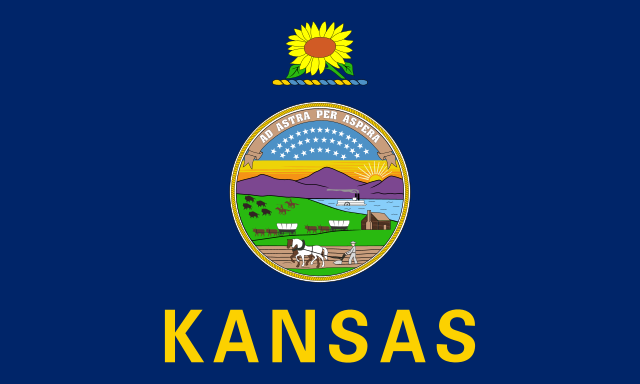 Flag of Kansas.svg by Xrmap is liscensed under Public Domain
Flag of Kansas.svg by Xrmap is liscensed under Public Domain
The state legislature in Kansas had the opportunity to put two state Constitutional amendments on the ballot. The state requires a supermajority in both chambers for a proposed amendment to get onto the ballot. Despite Republicans having a supermajority in both chambers, they were unable to get either SCR 1620 or SCR 1621 referred to the ballot.
SCR 1620 would have changed the necessary amount of votes to approve the creation of new taxes or an increase in an existing tax. The bill would have required a supermajority instead of a simple majority vote. The bill failed to be adopted after it received 25 votes in favor and 14 votes against.
The second Constitutional amendment that was considered was SCR 1621 which would have made Kansas’s Supreme Court nomination process identical to the Federal system. Currently, Kansas has a Supreme Court nomination commission that is comprised of mostly lawyers who are tasked with selecting three prospective judges for Governor. The Governor then selects one of the three for nomination. SCR 1621 would have eliminated the commission and would have allowed the Governor to have the power to nominate judges on their own and put them up to the State Senate for confirmation. The current process diminishes the influence of the electorate as the Governor must differ to a commission to select prospective judges, and there is no legislative oversight. The proposed amendment failed by one vote (26-13).
These are missed opportunities that would have shifted the accountability of judges away from well-connected lawyers toward elected officials and voters, and installed strong protections against tax increases.
A supermajority requirement to increase taxes is a significant barrier. There are 15 states with a supermajority requirement for tax hikes. States with these requirements see far fewer tax hikes than those that do not, their economies grow faster, and their rates of spending growth are lower.
One significant proposed constitutional amendment will appear on the ballot. HCR 5014 would allow the legislature to address situations where the bureaucracy implements legislation in a way that the legislature did not intend. For example, this could be implementing fees that were not explicitly laid out in a piece of legislation, adding costs for Kansas residents. If HCR 5014 is approved by voters, the legislature can pass new legislation to force the bureaucracy to change its implementation of prior legislation.
Unfortunately, Kansans will not have the chance to boost protections for their wallets this November, nor change the judicial selection process, but requiring a supermajority vote to increase taxes should remain a top goal for legislators in the future.

